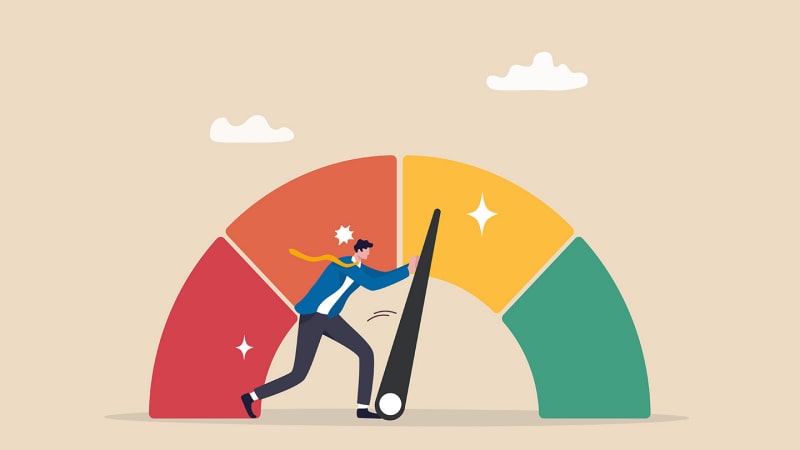595 credit score: A guide to credit scores

Quick insights
- A credit score of 595 is considered subprime by VantageScore® and fair by FICO® scoring models.
- Credit scores range from 300 to 850, with the average credit score in the U.S. being 715, according to Experian™.
- Having a credit score of 595 means you might face more challenges getting approved for credit products, or you may qualify for less favorable terms and conditions.
A credit score of 595 is considered fair according to FICO score 8 ranges, and subprime or not prime according to VantageScore. While it’s not in the lowest scoring category for FICO, it is for VantageScore; in any case, there’s still room for improvement. What else is there to know about a 595 credit score and how it might affect your access to credit? Let’s find out.
Understanding your 595 credit score
A credit score is a three-digit number that lenders use to assess borrowers’ creditworthiness. Lenders use consumers’ credit scores to make lending decisions, like whether to approve credit applications, what amount to borrow and what terms and conditions to set with customers. This is why having good credit can help. The higher the credit score, the better the chances of approval and qualifying for more favorable terms and conditions.
Credit scores typically range from 300 to 850, and 715 is the average credit score in the U.S. according to 2024 Experian data. Please note that while important, your credit score is just one of several factors lenders take into account when approving a loan.
Is 595 a good credit score?
A 595 score is not considered a good credit score by FICO or VantageScore. According to FICO, it’s considered fair, and according to VantageScore, it’s considered subprime or not prime. Here’s how it falls into the scoring ranges for each scoring model as of 2024.
VantageScore 3.0 scoring ranges look like:
- 781-850: Super prime
- 661-780: Prime
- 601-660: Near prime
- 300-600: Subprime/not prime
The scoring ranges for FICO score 8 look like:
- 800-850: Exceptional
- 740-799: Very good
- 670-739: Good
- 580-669: Fair
- 300-579: Poor
Having a credit score of 595 could make it harder to get approved for credit products—or it could mean you qualify for less favorable terms like higher interest rates.
Chances of approval with a 595 credit score
Your chances of approval for credit products like a mortgage or credit card with a 595 credit score depend on various factors. Some of these factors include:
- The type of credit you're applying for
- Your income
- Your credit utilization ratio
- Your debt-to-income ratio
- Your payment history
As you can see, there are many other factors that lenders take into account. Moreover, to help increase your chances of approval, you could try applying for credit cards or loans that are designed for people with lower credit scores. Some lenders also specialize in offering credit products to people with lower credit scores, but keep in mind that these products may come with higher interest rates or fees. It’s important to carefully review the terms and conditions before agreeing to anything.
When trying to qualify for a mortgage, there are also options such as getting a co-signer or putting down a larger down payment. Some lenders could loan you the money if they know you have a co-signer with stronger credit or some other collateral to help lower their risk.
How to improve a 595 credit score
With a credit score of 595, you might be thinking about how to improve it. Working toward a better credit score is possible, but it takes discipline and consistency.
Here are some steps you can take to improve your credit score:
- Make consistent on-time payments: Payment history accounts for a large portion of your credit score, so this could be a good area to focus on.
- Reduce your debt to improve your credit utilization ratio: Keeping your credit utilization ratio below 30% can help improve your credit score.
- Check your credit reports for errors or inaccuracies: Reviewing your credit reports regularly allows you to check for any errors or mistakes that could be bringing your score down. One way to do this is by requesting free copies of each of your reports from the major credit bureaus—Experian, Equifax® and TransUnion®—or using AnnualCreditReport.com.
- Avoid applying for too many credit products in a short time: Every hard credit check affects your credit score, so if you’re looking to optimize your score, be strategic about when you apply for new credit.
- Keep track of your credit score and how you're doing: You can sign up for a free online tool like Chase Credit Journey®, where you can view your credit score provided by Experian for free.
In conclusion
A 595 credit score is considered fair or subprime by some scoring models. A low score may mean you may face challenges when applying for loans or credit cards. It also could mean you’re more likely to encounter higher interest rates and stricter terms. However, having a 595 credit score is not the end of your financial journey—it’s an opportunity to take proactive steps toward improvement.
By paying bills on time, reducing your credit utilization and regularly monitoring your credit report, you can steadily raise your score and unlock better financial opportunities. Understanding your credit score is essential for making informed decisions.



